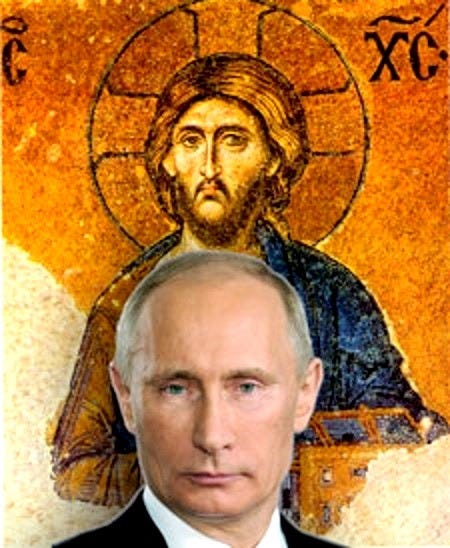Putin’s Crusade – Is Russia the Last Defender of the Christian Faith?
Full article HERE
For those of us who grew up in America being told that the godless communist atheists in Russia were our enemies, the idea that America might give up on God and Christianity while Russia embraces religion might once have been difficult to accept. But by 2015, the everyday signs in America show a growing contempt for Christianity, under the first president whose very claims of being a Christian are questionable. The exact opposite trend is happening for Russia and its leaders – a return to Christian roots.
Photo below – Rebuilding Christ the Savior Cathedral in Moscow

The article http://20committee.com/2014/12/27/putins-orthodox-jihad/ often referenced here suggests that underneath Vladimir Putin’s KGB-trained exterior persona – in which he is the tough and pragmatic leader of a Russia determined to defy America and the West – the inner Putin is basically a born again Christian (within the bounds of Russian Orthodox Christianity.)
“What motivates this is a complex question. Putin is a complex character himself, with his worldview being profoundly shaped by his long service as a Soviet secret policeman; he exudes what Russians term Chekism – conspiracy-based thinking that sees plots abounding and is reflexively anti-Western, with heavy doses of machismo and KGB tough-talk. Hence persistent Western efforts to view Putin as any Western sort of democratic politician, albeit one with a strange affectation for judo and odd bare-chested photo-ops with scary wild animals, invariably miss the mark…. In his fire-breathing speech to the Duma in March [2014] when he announced Russia’s annexation of Crimea, Putin included not just venerable KGB classics like warnings about the Western Fifth Column and “national traitors,” but also paeans to explicit Russian ethnic nationalism buttressed by Orthodox mysticism, with citations of saints from millennia past. This was the culmination of years of increasingly unsubtle hints from Putin and his inner circle that what ideologically motivates this Kremlin is the KGB cult unified with Russian Orthodoxy. Behind the Chekist sword and shield lurks the Third Rome.” [Remember that the Second Rome was the Byzantine Empire – Byzantium/Constantinople – now Istanbul – was once upon a time the dominant Christian Empire – and has always been the model for the Russian State, with its unique blending of Church and State. Unlike England and America, where the state is viewed only as a tool to serve the people, Russian leaders have always viewed the people as pawns serving the state.]
“According to his own account, Putin’s father was a militant Communist while his mother was a faithful, if quiet, Orthodox believer; one wonders what holidays were like in the Putin household. He was baptized in secret as a child but was not any sort of engaged believer during his KGB service — that would have been impossible, not least due to the KGB’s role in persecuting religion — but by his own account, late in the Soviet period, Putin reconciled his Chekism with his faith by making the sign of the cross over his KGB credentials. By the late 1990’s, Putin was wearing his baptismal cross openly, for all bare-chested photo ops.”

“Putin’s potent fusion of KGB values and Orthodoxy has been building for years, though few Westerners have noticed. Early in Putin’s years in the Kremlin, the younger generation of Federal Security Service (FSB) officers embraced a nascent ideology they termed “the system” (sistema), which was a sort of elitist Chekism — toughness free of corruption and based in patriotism — updated for the new 21st century. However, this could have limited appeal to the masses, so its place was gradually taken by a doctrine termed “spiritual security.” This involved the ideological fusion of the FSB and the Russian Orthodox Church (ROC), culminating in the 2002 dedication of an Orthodox church at the Lubyanka, the FSB — and former KGB’s — notorious Moscow headquarters. It suddenly became fashionable for senior FSB officers to have conversion experiences, while “spiritual security” offered Putin’s Russia a way to defend itself against what it has long seen as the encroachment of decadent post-modern Western values.”
read more HERE
